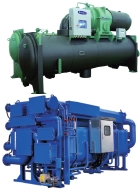Klima-Therm offers centrifugal chillers and absorption chillers

Klima-Therm has signed UK distribution agreements for absorption chillers made by World Energy of Korea and centrifugal chillers from Chinese manufacturer Gree. The agreements add significantly to the range of services this chiller and air-conditioning specialist can offer, based on proven platforms from leading manufacturers.
Tim Mitchell, Klima-Therm’s sales directors, says, ‘With the acquisition of centrifugal and absorption chillers, we are now in the position of being able to offer a range of fully referenced chiller alternatives for a project, enabling clients to decide on the most appropriate technical and commercial solution. Very few companies have the capability to do this.’
Star products in the Gree range are its variable-speed centrifugal chiller and photo-voltaic-powered inverter chiller. The PV chiller can also feed power directly into the grid.
Klima-Therm is supporting the launch of Gree centrifugal chillers with a 5-year warranty.
A characteristic of World Energy absorption systems is very high efficiency and the ability to operate across a wide range of waste-heat types and temperatures. Absorption machines are specifically designed for each project and application.







